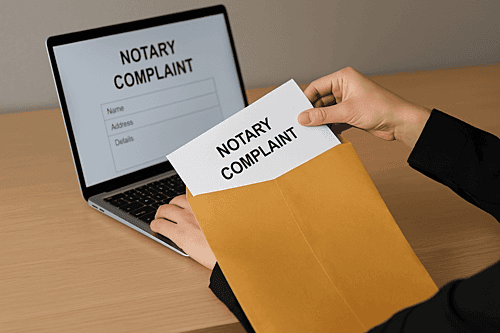Outline: What Happens When a Complaint is Filed Against a Notary

1. Complaint is Received by the State Agency
Typically submitted to the Secretary of State, Department of State, or designated Notary Enforcement Division.
Complaints can come from:
The signer/client
Financial institutions
Attorneys
Courts
Other public agencies
The complaint must usually include:
A detailed description of the alleged misconduct.
Copies of the notarized document(s) involved.
Witness statements or other evidence.
2. Acknowledgment of Complaint (Within 2–4 Weeks)
You (the notary) will usually receive a formal letter or email from the state acknowledging that a complaint has been filed.
The letter may outline:
The general nature of the complaint.
A request for your written response.
A deadline (often 20 to 30 days) to submit your side of the story.
Some states allow the notary to request a copy of the full complaint.
3. Investigation Phase (1–6 Months Typically)
The state agency conducts an investigation, which can include:
Reviewing your response.
Examining your notary journal, if applicable.
Interviewing witnesses or complainants.
Reviewing the notarized documents for compliance (e.g., missing verbiage, improper notarization, forged signatures).
You might be asked for additional documentation, especially proof that you performed your duties properly (journal entries, training certificates, etc.).
4. Possible Interim Actions
In serious cases (fraud, forgery, patterns of misconduct), a temporary suspension of your commission can be issued while the investigation is pending.
For minor issues (clerical errors), you may still work while under investigation.
5. Final Decision (Typically 4–12 Months After Complaint Filed)
Possible Outcomes:
No Violation Found: Complaint dismissed. You are notified in writing.
Warning Letter Issued: Non-disciplinary but placed in your file for future reference.
Administrative Penalty: Fine imposed (common fines are $100–$5,000 depending on severity).
Suspension or Revocation: Your commission is temporarily or permanently removed.
Mandatory Education: Some states require completion of a notary training course at your own expense.
You will receive a formal written notification of the outcome.
6. Appeal Process (Optional)
If disciplinary action is taken, you often have 30 days (varies by state) to file an appeal.
This may involve:
A formal administrative hearing.
Presentation of additional evidence or witnesses.
Typical Timeline from Start to Finish:
| Step | Estimated Timeframe |
|---|---|
| Complaint filed | Day 0 |
| Acknowledgment letter sent | 2–4 weeks |
| Notary response deadline | 20–30 days after acknowledgment |
| Investigation phase | 1–6 months |
| Final decision issued | 4–12 months total |
📢 Important Things to Remember as a Notary Public:
Respond promptly and professionally if you receive a complaint notice.
Do NOT ignore letters or deadlines. Silence is seen as guilt.
Keep copies of all your notarizations and any journal entries organized.
Stay calm: Not every complaint leads to suspension or revocation — especially if you have a clean record and strong documentation

